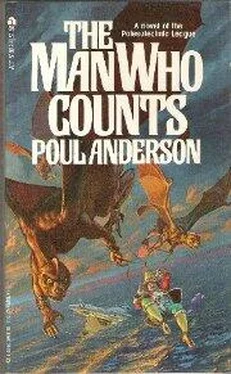Ordinarily a hunter, with occasional meals of nuts or fruit or wild grain, the Diomedean exercised in spurts. Migration called for prolonged effort; it must have taken hundreds or thousands of generations to develop the flying muscles alone, time enough to develop other adaptations as well. So this effort stimulated certain glands, which operated through a complex hormonal system to waken the gonads. (An exception was the lactating female, whose mammaries secreted an inhibiting agent.) During the great flight, the sex hormone concentration built up — there was no time or energy to spare for its dissipation. Once in the tropics, rested and fed, the Diomedean made up for lost opportunities. He made up so thoroughly that the return trip had no significant effect on his exhausted glands.
Now and then in the homeland, fleetingly, after some unusual exertion, one might feel stirrings toward the opposite sex. One suppressed that, as rigorously as the human suppresses impulses to incest, and for an even more practical reason: a cub born out of season meant death on migration for itself as wfell as its mother. Not that the average Diomedean realized this overtly; he just accepted the taboo, founded religions and ethical systems and neuroses on it — However, doubtless the vague, lingering year-round attractiveness of the other sex had been an unconscious reason for the initial development of septs and flocks.
When the migratory Diomedean encountered a tribe which did not observe his most basic moral law, he knew physical horror.
Drak’ho Fleet was one of several which have now been discovered by traders. They may all have originated as groups living near the equator and thus not burdened by the need to travel; but this is still guesswork. The clear fact is that they began to live more off the sea than the land. Through many centuries they elaborated the physical apparatus of ships and tackle, until it had become their entire livelihood.
It gave more security than hunting. It gave a home which could be dwelt in continuously. It gave the possibility of constructing and using elaborate devices, accumulating large libraries, sitting and thinking or debating a problem — in short, the freedom to encumber oneself with a true civilization, which no migrator had except to the most limited degree. On the bad side, it meant grindingly hard labor and aristocratic domination.
This work kept the deckhand sexually stimulated; but warm shelters and stored sea food had made his birthtime independent of the season. Thus the sailor nations grew into a very humanlike pattern of marriage and child-raising: there was even a concept of romantic love.
The migrators, who thought him depraved, the sailor considered swinish. Indeed, neither culture could imagine how the other might even be of the same species.
And how shall one trust the absolute alien?
“It is these ideological pfuities that make the real nasty wars,” said Van Rijn. “But now I have taken off the ideology and we can sensible and friendly settle down to swindling each other, nie?”
He had not, of course, explained his hypothesis in such detail. Lannach’s philosophers had some vague idea of evolution, but were weak on astronomy; Drak’ho science was almost the reverse. Van Rijn had contented himself with very simple, repetitious words, sketching what must be the only reasonable explanation of the well-known reproductive differences.
He rubbed his hands and chortled into a tautening silence. “So! I have not made it all sweetness. Even I cannot do that overnights. For long times to come yet, you each think the others go about this in disgusting style. You make filthy jokes about each other… I know some good ones you can adapt. But you know, at least, that you are of the same race. Any of you could have been a solid member of the other nation, nie? Maybe, come changing times, you start switching around your ways to live. Why not experiment a little, ha? No, no, I see you can not like that idea yet, I say no more.”
He folded his arms and waited, bulky, shaggy, ragged, and caked with the grime of weeks. On creaking planks, under a red sun and a low sea wind, the scores of winged warriors and captains shuddered in the face of the unimagined.
Delp said at last, so slow and heavy it did not really break that drumhead silence: “Yes. This makes sense. I believe it.”
After another minute, bowing his head toward stone-rigid T’heonax: “My lord, this does change the situation. I think — it will not be as much as we hoped for, but better than I feared — We can make terms, they to have all the land and we to have the Sea of Achan. Now that I know they are not… devils… animals — Well, the normal guarantees, oaths and exchange of hostages and so on — should make the treaty firm enough.”
Tolk had been whispering in Trolwen’s ear. Lannach’s commander nodded. “That is much my own thought,” he said.
“Can we persuade the Council and the clans, Flockchief?” muttered Tolk.
“Herald, if we bring back an honorable peace, the Council will vote our ghosts godhood after we die.”
Tolk’s gaze shifted back to T’heonax, lying without movement among his courtiers. And the grizzled fur lifted along the Herald’s back.
“Let us first return to the Council alive, Flock-chief,” he said.
T’heonax rose. His wings beat the air, cracking noises like an ax going through bone. His muzzle wrinkled into a lion mask, long teeth gleamed wetly forth, and he roared:
“No! I’ve heard enough! This farce is at an end!”
Trolwen and the Lannacha escort did not need an interpreter. They clapped hands to weapons and fell into a defensive circle. Their jaws clashed shut automatically, biting the wind.
“My lord!” Delp sprang fully erect.
“Be still!” screeched T’heonax. “You’ve said far too much.” His head swung from side to side. “Captains of the Fleet, you have heard how Delp hyr Orikan advocates making peace with creatures lower than the beasts. Remember it!”
“But my lord—” An older officer stood up, hands aloft in protest. “My lord admiral, we’ve just had it shown to us, they aren’t beasts… it’s only a different—”
“Assuming the Eart’ho spoke truth, which is by no means sure, what of it?” T’heonax fleered at Van Rijn. “It only makes the matter worse. We know beasts can’t help themselves but these Lannach’honai are dirty by choice. And you would let them live? You would… would trade with them… enter their towns… let your young be seduced into their — No!”
The captains looked at each other. It was like an audible groan. Only Delp seemed to have the courage to speak again.
“I humbly beg the admiral to recall, we’ve no real choice. If we fight them to a finish, it may be our own finish too.”
“Ridiculous!” snorted T’heonax. “Either you are afraid or they’ve bribed you.”
Tolk had been translating sotto voce for Trolwen. Now, sickly, Wace heard the commander’s grim reply to his Herald: “If he takes that attitude, a treaty is out of the question. Even if he made it, he’d sacrifice his hostages to us — not to speak of ours to him — just to renew the war whenever he felt ready. Let’s get back before I myself violate the truce!”
And there, thought Wace, is the end of the world. I will die under flung stones, and Sandra will die in Glacier Land. Well… we tried.
He braced himself. The admiral might not let this embassy depart.
Delp was looking around from face to face. “Captains of the Fleet,” he cried, “I ask your opinion… 1 implore you, persuade my lord admiral that—”
“The next treasonable word uttered by anyone will cost him his wings,” shouted T’heonax. “Or do you question my authority?”
Читать дальше











